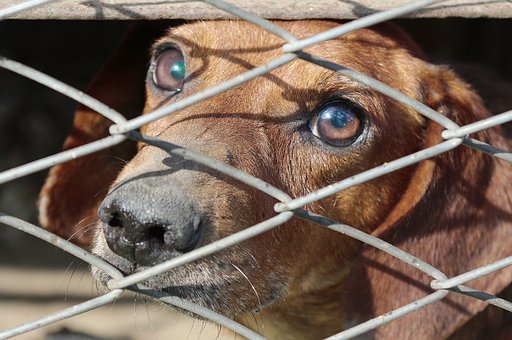No matter what, NEVER buy a puppy from a pet store, a swap meet, an online ad or a newspaper advertisement, because it’s a no-win for everyone.
Puppy Mills
What, you may be wondering, is a puppy mill?
A “mill” is a place where puppies, kittens and bunnies are manufactured by hateful, greedy, and unscrupulous humans to make a profit. Puppy mills are sometimes called puppy farms.
Part of a high-volume puppy-producing industry, they are hideous places where puppies are bred solely for profit. Loveable little puppies are kept in tiny, filthy cages with caked feces and only God knows what else. They are horrible places where dogs don’t receive any affection. Puppies don’t get any exercise, and they don’t receive proper veterinary care.
Puppy mill puppies are only let out when it’s time to be shipped across the country so they can be sold to pet shop owners, swap meet vendors, and online buyers and others.
The mothers and fathers of these puppies are often sick animals, who suffer in tiny, filthy cramped spaces. They, too, never see the light of day. Never feel the loving touch of a human hand. Considered – and treated – as simply breeding machines, they are given little or no recovery time between litters. When the mothers (and fathers) can no longer produce puppies, they are killed.
That’s what a puppy mill is!
We Can Put An End To Puppy Mills
How?
1 – No matter what, NEVER buy a puppy from a pet store, a swap meet, an online ad or a newspaper advertisement, because it’s a no-win for everyone.
2 – Do NOT buy a puppy from a pet store. No matter how cute they may be, you do not know where they came from. If you suspect that a neighbor, or someone you know is involved in the puppy mill trade, report them to the ASPCA immediately.
3 – ADOPT your next pet from a shelter or rescue.
4 – ONLY buy a puppy from a RESPONSIBLE BREEDER. A responsible breeder is one that will meet you at the place where they breed dogs, can and will show you where the puppy was born, who its mother is, where she lives, and the environment the puppy lived in before your purchase.
5 – NEVER buy supplies from a pet store that sells puppies because it helps support the industry.
Don’t Continue to Contribute to this Dreadful Industry!
By purchasing pups bred in puppy mills – from pet stores, flea markets, through classified ads, from crooked breeders – you might be removing the puppies from a filthy life, but your purchase only contributes to these “hubs of animal cruelty.” (The Los Angeles Times)
In addition, there is no way for you to tell, when you’re buying puppy mill puppies, what ailments are going to show up as the puppy begins to grow up.
“[T]he puppies from puppy mills frequently suffer from a variety of health issues, creating heartbreaking challenges for families who should be enjoying the delights of adopting a new family member.” (humanesociety.org)
Some of those physical challenges include: pneumonia, mange, fleas, ticks, intestinal parasites, heartworm, chronic diarrhea, deafness, eye problems (including cataracts, glaucoma, progressive retinal atrophy, etc.). And a whole lot more!

Consider these facts when you’re thinking about getting a puppy or a dog:
The Humane Society estimates there are 10,000 active puppy mills in the United States. “Sadly, a license is not a guarantee of a breeder’s quality.” (humanesociety.org)
Over 194,000 dogs in USDA-licensed facilities are kept solely for the purpose of breeding. Over 2,000,000 puppies originate from puppy mills and are sold each year. (humanesociety.org)
Puppies are bred in puppy mills all over the U.S. Then they are shipped out, in every direction (e.g., from the Midwest to California or Florida) in absolutely inhumane conditions. Many puppies do not survive because they are not given food or water for as many as 12 hours, and they are confined in a small space where diseases can be (and often are) easily transmitted.
Stop The Demand
The only real way to shut down puppy mills is to stop the demand. If you really must have a purebred puppy or dog, contact the American Kennel Club (United States). They will direct you to the right organization. These societies are completely dedicated to re-homing pedigree dogs, and, by adopting this way, you are quite literally saving lives.
It’s extremely frustrating that some people see adoption centers as full of “problematic dogs.” Pets in rescue should never be tainted, as being those with “behavioral problems,” because this is largely untrue!
Most pets adopted from shelters are loving, faithful and devoted to their fur-parents and form close bonds with their sitters.
Reputable Breeders v. Puppy Mills
Here are some ways to recognize whether you’re dealing with a reputable breeder or a representative of a puppy mill:
| Reputable Breeders | Puppy Mills |
| Licensed by USDA to breed dogs | Licensed by USDA to breed dogs |
| Can show you legitimate papers | May have forged papers or no papers |
| Has two (possibly three) litters annually | Has a litter every time the bitch is in heat |
| Will invite you to their home base | Will meet you at another location |
| Will introduce you to puppy’s mother | No introduction to puppy’s mother |
| Will show you puppy’s environment | No environment show and tell |
| Will answer all your questions | No Q&A |
| Interested in the health of the breed | Interested in getting your money |
| Tests dogs for possible health issues | No testing of any kind |
| Maintains dogs in clean environs | Maintains dogs in squalor |
| Seeks to educate you, not push the sale | The sale is the main thing |
| Will enquire as to your adoption reasons | Will only be interested in your money |
| Can you maintain the pet after adoption? | Can you close the sale right now? |
Be sure to do your due diligence. Ask questions, and don’t release any money until you are satisfied everything is on the up-and-up.
1.2 Million Dogs Are Euthanized In Shelters Every Year
An estimated 1.2 million dogs are euthanized in shelters every year because someone decided they are inferior for the reasons that some are not purebred, some are mixed breeds, and some are older. Please do not attach a stigma to pets that end up in need of rescue.
Remember, dogs can find themselves in need of rescue as a result of a marriage breakup, or in instances where families have moved out of the country and been unable to take their pets with them, or due to a change in circumstances (e.g., financial), which has left their caregivers unable to continue care for their animals.
Far from being unadoptable, rescue dogs make the most wonderful pets, and a good rescue organization will temperament test and offer training were necessary. They will also be fully assessed, health checked, micro-chipped and spayed or neutered before going out into their new home, so please give them a chance.
See For Yourself
sk
The week of May 6 through 11 is Puppy Mills Action Week.
Resources:
akc.com
aspca.org
The Los Angeles Times, September 20, 2017
humanesociety.org
thepuppymillproject.org
onegreenplanet.org
yourdogsfriend.org


Pingback: July Pet Awareness Days | WetNoseCentral
Pingback: May Pet Happenings - WetNoseCentral